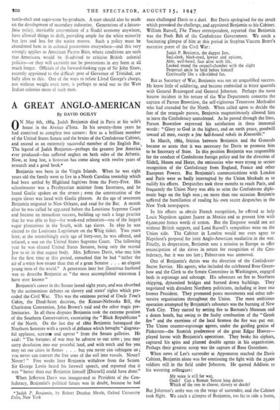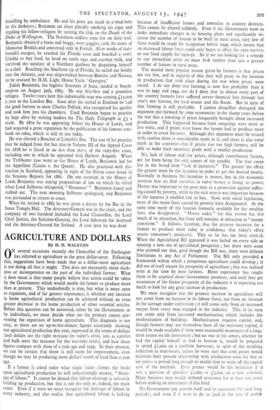A GREAT ANGLO-AMERICAN
By DAVID OGILVY
ON May 6th, 1884, Judah Benjamin died in Paris at his wife's house in the Avenue d'Iona. In his seventy-three years he had contrived to complete two careers: first as a brilliant member of the United States Senate and the brains of the Confederate Cabinet, and second as an extremely successful member of the English Bar.. The legend of Judah Benjamin—perhaps the greatest Jew America ever produced—has suffered neglect on both sides of the Atlantic. Now, at long last, a historian has come along with twelve years of research and a good book.* Benjamin was born in the Virgin Islands. When he was eight years old the family went to live in a North Carolina township which had been settled by Highland fugitives from the Forty-Five. His schoolmaster was a Presbyterian minister from Inverness, and he heard Gaelic spoken on the streets ; even the conversation of the negro slaves was laced with Gaelic phrases. At the age of seventeen Benjamin migrated to New Orleans, and read for the Bar. A month after he was 'called he appeared before the Louisiana Supreme Court and became an immediate success, building up such a large practice that he was able to buy—for week-end relaxation—one of the largest sugar plantations in the South, with 140 slaves. In 185o he was elected to the Louisiana Legislature on the Whig ticket. Two years later, at the astonishingly early age of forty-one, he was offered, and refused, a seat on the United States Supreme Court. The following year he was elected United States Senator, being only the second Jew to sit in that august body. Mrs. Jefferson Davis, who met him for the first time at this period, remarked that he had "rather the air of a witty bon vivant than that of a great Senator . . . an elegant young man of the world." A generation later her illustrious husband was to describe Benjamin as " the most accomplished statesman I have ever known " Benjamin's career in the Senate lasted eight years, and was absorbed by the acrimonious debates on slavery and states' rights which pre- ceded the Civil War. This was the ominous period of Uncle Tom's Cabin, the Dred-Scott decision, the Kansas-Nebraska Bill, the Charleston Convention, John Brown's raid and the other tragic pre- liminaries. In all these disputes Benjamin took the extreme position of the Southern Conservatives, excoriating the "Black Republicans" of the North. On the last day of 186o Benjamin harangued the Northern Senators with a speech of defiance which brought " disgrace- ful applause, screams and uproar" from the Senate galleries. He said: " The fortunes of war may be adverse to our arms ; you may carry desolation into our peaceful land, and with torch and fire you may set our cities in flames . . . but you never can subjugate us ; you never can convert the free sons of the soil into vassals. Never! Never! " Five weeks later Benjamin withdrew from the Senate. Sir George Lewis heard his farewell speech, and reported that it was " better than our Benjamin himself [Disraeli] could have done"
When Jefferson Davis was inaugurated as President of the Con- federacy, Benjamin's political future was in doubt, because he had
* yuclah P. Benjamin, by Robert Douthat Meade, Oxford University Press, New York once challenged Davis to a duel. But Davis apologised for the insult which provoked the challenge, and appointed Benjamin to his Cabinet. William Russell, The Times correspondent, reported that Benjamin was the Pooh Bah of the Confederate Government. We catch a fascinating glimpse of him at this period in Stephan Vincent Benet's narrative poem of the Civil War:
Judah P. Benjamin, the dapper Jew, Seal-sleek, black-eyed, lawyer and epicure, Able, well-hated, face alive with life, Looked round the council-chamber with the slight Perpetual smile he held before himself Continually like a silk-ribbed fan.
But as Secretary of War, Benjamin was not an unqualified success. He knew little of soldiering, and became embroiled in bitter quarrels with General Beauregard and General Johnston. Perhaps the most bizarre incident in his tenure of the War Department concerns the capture of Parson Brownlow, the self-righteous Tennessee Methodist who had crusaded for the North. When called upon to decide the fate of the renegade parson, Benjamin-magnanimously allowed him to leave the Confederacy unmolested. As he passed through the lines, Parson Brownlow expressed his satisfaction in these immortal words : " Glory to God in the highest, and on earth peace, goodwill toward all men, except a few hell-bound rebels in Knoxville."
In March, 1862, friction between Benjamin and the Generals became so acute that it was necessary for Davis to promote him to be Secretary of State. In this position Benjamin was responsible for the conduct of Confederate foreign policy and for the direction of Slidell, Mason and Hone, the emissaries who were trying to secure recognition of the Confederacy from England, France and other European Powers. But Benjamin's communications with London and Paris were so badly interrupted by the Union blockade as to nullify his efforts. Despatches took three months to reach Paris, and frequently the Union Navy was able to seize the Confederate diplo- matic bags on the high seas ; on more than one occasion Benjamin suffered the humiliation of reading his own secret despatches in the New York newspapers.
In his efforts to obtain French recognition, he offered to help Louis Napoleon against Juarez in Mexico and to present him with 63,000,000 francs worth of cotton. But the Emperor would not act without British support, and Lord Russell's sympathies were on the Union side. The Cabinet in London would not even agree to Napoleon's proposal for joint Anglo-American mediation in the war. Finally, in desperation, Benjamin sent a mission to Europe to offer emancipation of the slaves in return for recognition of the Con- federacy, but it was too late ; Palmerston was unmoved.
One of Benjamin's duties was the direction of the Confederatr Secret Service. His agents, who included the celebrated Rose Green- how and the Clerk to the Senate Committee in Washington, engaged both in espionage and sabotage. His saboteurs set fire to Northern shipping, dynamited bridges and burned down buildings. 'They negotiated with dissident Northern politicians, including at least one former President. They promoted peace movements and other sub- versive organisations throughout the Union. The most ambitious operation attempted by Benjamin's saboteurs was the burning of New York City. They started by setting fire to Barnum's Museum and a dozen hotels, but owing to the faulty combustion of the " Greek fire " and the exertions of the local firemen the fire was put out. The Union counter-espionage agents, under the guiding genius of Pinkerton—the Scottish predecessor of the great Edgar Hoover— played havoc with Benjamin's operations. They broke his ciphers, captured his spies and planted double agents in his organisation. Perhaps their greatest scoop was the capture of Rose Greenhow.
When news of Lee's surrender at Appomatox reached the Davis Cabinet, Benjamin alone was for continuing the fight with the 25,000 soldiers still in the field under Johnston. He quoted Addison to his wavering colleagues:
My voice is still for war, Gods! Can a Roman Senate long debate Which of the two to choose, slavery or death?
But Johnston's artily was on the verge of surrender, and the Cabinet took flight. We catch a glimpse of Benjamin, too fat to ride a horse,
travelling by ambulance. He and his party got stuck in a mud-hole in the darkness ; Benjamin sat there placidly smoking his cigar and regaling his fellow-refugees by reciting the Ode on the Death of the Duke of Wellington. The Northern soldiers were hot on their trail. Benjamin obtained a horse and buggy, wore goggles, took the name of Monsieur Bonfals and conversed only in French. After weeks of hair- breadth escapes, he reached the Florida coast and boarded a yawl. Unable to buy food, he lived on turtle eggs and coconut milk, and survived the scrutiny of a Northern gunboat by disguising himself as a chef. Reaching the Southern tip of Florida, he sailed out boldly into the Atlantic, and was shipwrecked between Biminis and Nassau, to be rescued by H.M. Light House Yacht ' Georgina.'
Judah Benjamin, the fugitive Secretary of State, landed at South- ampton on August 3oth, 1865. He was fifty-five and a penniless refugee. Twelve years later this indomitable man was earning L15,000 a year at the London Bar. Soon after his arrival in England he Lad the good fortune to meet Charles Pollock, who recognised his quality and took him into his chambers. Until Benjamin began to practise he kept alive by writing leaders• for The Daily Telegraph at £5 a week. By 187o he was appearing before the House of Lords, and had acquired a great reputation by the publication of his famous text- book on sales, which is still in use today.
He was elected a Bencher of Lincoln's Inn. The size of his practice may be judged from the fact that in Volume III of the Appeal Cases for .1878 he is listed in no less than thirty of the sixty-five cases, including one in which he appeared with Herbert Asquith. When the Tichborne case went to the House of Lords, Benjamin led for the Appellant (Castro v. the Queen). He also practised with dis- tinction in Scotland, appearing in eight of the fifteen cases listed in the Sessions Reports for 1881. On one occasion in the House of Lords Benjamin was stating propositions of law on which he relied when Lord Selborne whispered, " Nonsense! " Benjamin heard and stalked out. The next morning Selborne apologised, and Benjamin was persuaded to return to court.
When he retired in 1883 he was given a dinner by the Bar in the Inner Temple Hall. The Attorney-General was in the chair, and the company of two hundred included the Lord Chancellor, the Lord Chief Justice, the Solicitor-General, the Lord Advocate for Scotland and the Attorney-General for Ireland. A year later he was dead.



































 Previous page
Previous page